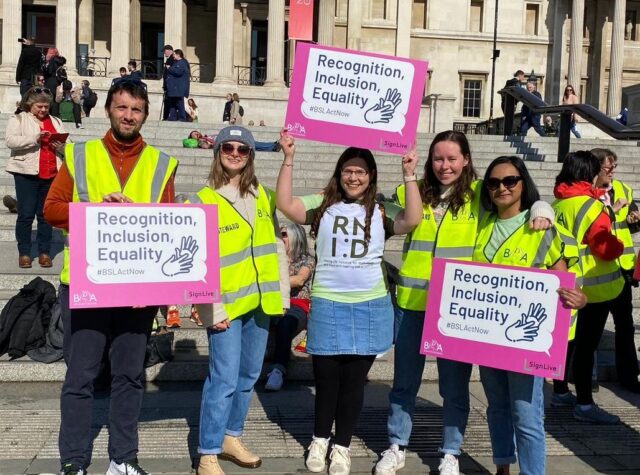Watch this page in BSL
As the Covid Inquiry begins to investigate the pandemic’s impact on healthcare in the UK, our Director for Insight and Policy, Victoria Boelman, explains RNID’s involvement in the inquiry and sets out what we are hoping to achieve.
The impact of the Covid pandemic
The Covid pandemic was a huge event which transformed our society. It had a devastating impact on the nation’s health and our ability to lead an everyday life whilst it was happening. We are also still living with the consequences and changes the pandemic caused.
Whether through NHS waiting lists, the increase of working from home or the increased use of video calls for socialising or accessing services – the impact of the pandemic is still with us today – and especially for deaf and disabled people when accessing healthcare.
What is the COVID-19 Inquiry?
The UK Covid Inquiry is the independent public judge-led investigation into the UK’s response to, and impact of, the Covid-19 pandemic. It also seeks to help us learn lessons for the future.
The Inquiry is structured around ten modules (separate stages of the inquiry). Module Three will begin its public hearings on 9 September 2024 and examine the impact of the Covid-19 pandemic on healthcare systems in the four nations of the UK.
RNID and the Disability Charities Consortium
RNID will be involved in the proceedings on Module Three as a member of the Disability Charities Consortium (DCC) – a group of the nine leading disability charities.
The DCC is a ‘Core Participant’ in this hearing, which means it will have a direct input into the inquiry. The DCC will submit information, and have barristers speak for us in the evidence sessions and suggesting questions when witnesses give evidence.
The impact of the pandemic on deaf and disabled people
Deaf and disabled people suffered a disproportionate burden during the pandemic. This is demonstrated by the pandemic’s mortality statistics, which show that disabled people, who account for 22% of the population, made up 58% of deaths. It’s crucial that we learn the lessons of these failures as a society.
Existing barriers to accessing health
Even before the pandemic, deaf and disabled people struggled to access health and social care services. Despite the introduction of the Accessible Information Standard (AIS), people who are deaf and have hearing loss were often left without accessible methods to contact their GP during the pandemic and the communication support they requested at appointments. This remains a problem today.
Additionally, the NHS made changes during the pandemic that increased these barriers – such as the introduction of mandatory face masks and of remote phone appointments, which we are still sometimes using. These policies made sense in terms of infection control, but reduced access for people who are deaf or have a hearing loss.
Our research during the pandemic showed that 60% of our community had ‘put off’ seeking medical advice from their GPs since the introduction of remote appointments and 38% of BSL users had difficulty securing communication support when they did get an appointment.
What we will raise during the hearing
Together with the DCC, RNID will push the Covid Inquiry to consider why the Government and NHS didn’t think about the needs of deaf and disabled people when they introduced new rules during the pandemic. An example of two issues we want to inquiry to discuss and consider:
- Why didn’t the Department of Health and Social Care roll out the use of clear face masks across the NHS? Despite these products being available, people with hearing loss were never empowered to request their healthcare professional wear a clear mask that would have allowed lipreading.
- Why didn’t the NHS offer a video relay service to allow BSL users to access remote services? It’s an outrage that the charity SignHealth had to provide this service to the Deaf community out of its own funds.
Through the DCC we will ensure that the failings impacting deaf and disabled people during the pandemic are considered in the inquiry. Examining these questions now can ensure that we learn lessons from the pandemic, build a move equitable society for normal everyday times and better prepare for future crises.
Share your story directly with the Covid Inquiry via Every Story Matters.
